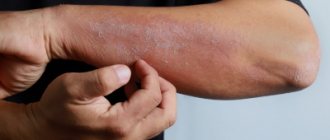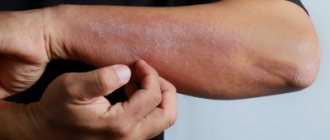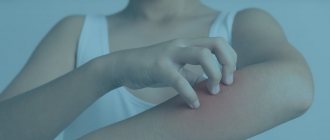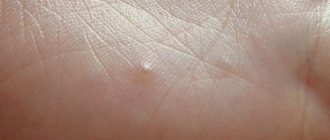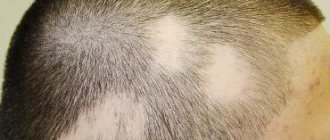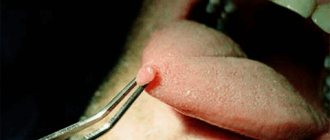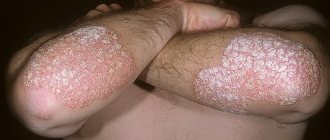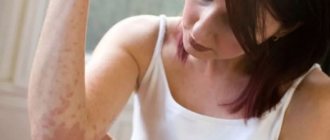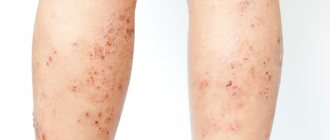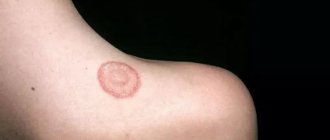Causes of eczema
The exact cause of this condition is unknown, but the process is based on an overactive reaction of the body's immune system to an irritant or allergen. Substances are formed in the cells of the dermis that cause inflammation, which is associated with the main symptoms. It is also known that the tendency to this disease is inherited.
The therapy is aimed at suppressing inflammation and allergies, as well as healing, eliminating itching and dryness.
Topical medications are available in various forms. Each type of skin lesion has its own dosage form.
- Ointment - has a fatty base with which the medicine is mixed directly, it is more suitable for dry eczema and dermatitis on the hands, it cannot be used on wet areas, it may not be hormonal, or contain hormones. The active components penetrate the skin well, and the fat base itself is not absorbed.
- The cream contains water with a medicine dissolved in it, which is mixed with a fat base. Contains significantly less fat than ointment, so it is suitable for weeping eczema. It is better absorbed and does not leave greasy marks on clothes. The healing components of the cream penetrate the skin less well and usually act in its upper layers.
- In the paste, the concentration of dry substances is more than 25%.
- Lotion is a liquid dosage form (usually an aqueous solution of a drug plus oil). Lotions are suitable for wet conditions, as well as on the head under the hair.
Expert opinion
— The selection of hormonal/non-hormonal agents for external use is carried out by a specialist after collecting an anamnesis, identifying the causes that provoked the disease, and examination.
Firsakova Svetlana Sergeevna, dermatovenerologist, Melanoma Unit Moscow clinic
Course and treatment of the disease in children, pregnant and lactating women, the elderly
Children. The cause of the development of nervous eczema in a child is usually due to unfavorable heredity. Symptoms of the disease may first appear in the first year of life - the baby develops red spots with clear boundaries. Their area increases, which causes severe discomfort. Uncontrolled itching due to the child’s age often leads to a secondary infection.
It is important to detect and begin treatment of the disease in a timely manner. Many mothers mistakenly confuse eczema with diathesis, initially treating the disease lightly, and self-medicate by bathing the child in baths with celandine, treating the skin with Panthenol, etc. The lack of adequate therapy leads to the fact that the disease becomes chronic and subsequently difficult to treat .
Pregnant and lactating women. Signs of nervous eczema in expectant and nursing mothers are by no means uncommon. During the period of bearing a baby and subsequent breastfeeding, a woman may worry about various reasons, face postpartum depression and other stress factors. All this can provoke a relapse of chronic eczema or cause an acute phase of the disease that occurs for the first time.
It is not recommended to neglect the disease and ignore its treatment during pregnancy and breastfeeding: there is a risk that the pathology will manifest itself in the child in the future. It is important to be under the supervision of a specialist and strictly follow his recommendations.
Elderly. In old age, both men and women equally often suffer from the appearance of nervous eczema. The disease is characterized by a relapsing course with acute phases of inflammatory symptoms, complicated by serous lesions of the epidermis. The development of pathology is facilitated by age-related depletion of the nervous system, weakened immunity, vitamin deficiency, poor nutrition and a tendency to allergies.
Treatment of pathology has the same directions as for other patients. In addition to relieving the external symptoms of nervous eczema, it is necessary to regulate the immune system, normalize neuropsychic health, and treat concomitant somatic ailments.
Hormonal agents
All hormonal medications contain synthetic derivatives of the adrenal cortex. In a healthy body, they play the role of stress mediators and help adapt the functioning of all organs to changing conditions. Their ability to regulate immunity makes them very useful in many dermatological diseases in which inflammation and allergies play a role. Glucocorticoids affect the functioning of cells responsible for the inflammatory process. Thanks to this, chemical compounds that cause symptoms do not enter the bloodstream. Hormones enter the dermis layers and eliminate redness, swelling, itching, and rashes.
Hormone therapy is contraindicated in certain conditions:
- Rosacea
- Acne
- Viral diseases of the epithelium
- Skin infection caused by bacteria or fungi
- Reaction to vaccine administration
- Tuberculosis
- Scabies
- In pregnant women and children, these medications should not be applied to large areas of the body or covered with a bandage.
Advantan
A modern medicine that is well tolerated and has minimal negative effects. This ointment effectively helps relieve symptoms of psoriasis, eczema and dermatitis, and can be used on the arms and legs, as well as on the face. The drug practically does not enter the bloodstream; even after application over large areas, traces of this drug are not detected in the blood. Advantan is approved for people of any age. Expectant mothers should be treated with caution. Local side effects rarely occur with long-term therapy without medical supervision. This may include atrophy, redness and acne. Systemic adverse effects have not been described.
Hydrocortisone
It is based on the synthetic steroid hydrocortisone, one of the weakest glucocorticoids, with which it is better to start treating eczema. If the lesion covers a large area, the skin is severely damaged and is covered with a bandage, hydrocortisone is likely to enter the bloodstream and produce systemic effects.
Hydrocortisone can be treated from the age of two; it is prohibited during pregnancy.
Dermovate
This drug is the most powerful among pharmacological products with glucocorticoids. It is prescribed only in the most acute period, then switching to less powerful drugs. You should not use it for more than four weeks, as this may lead to side effects. At the same time, if the effect of therapy is not visible within several weeks, you need to recheck the diagnosis, because Dermovate shows extremely high effectiveness for eczema conditions.
Lokoid
Lokoid is a very strong glucocorticoid. It is effective for severe forms of atopy, but with prolonged use it causes serious atrophy of the skin, which sometimes persists even after discontinuation. Lokoid is absorbed into the bloodstream in small quantities, but systemic side effects, unlike local ones, easily go away after the end of the course. Pregnant women are allowed to be treated with Lokoid, using caution. Although it enters the bloodstream and through the placenta, a very short course of therapy is usually required, so there is no harmful effect on the fetus.
Lorinden
Loriden's formulation contains a powerful glucocorticoid combined with salicylic acid, which dissolves epithelial scales and helps the hormone penetrate deeper and work better, and also disinfects the skin in the area of application.
It is safe for children and expectant mothers only in small areas.
Prednisolone
This is a medium-strength remedy with which you can begin treating mild to moderate eczema. It easily penetrates the blood, so the course of treatment should be short, and during pregnancy it should be used carefully.
Soderm
This is an effective ointment for eczema on the skin, including the hands and face, is safe for use in adults and children, and patient reviews indicate that it is well tolerated. The active substance Soderma practically does not penetrate into the blood.
Flucinar
A highly active steroid with pronounced anti-inflammatory activity. Prescribed only for a short course due to local side effects. Since it enters the body, it can cause systemic complications and is contraindicated for pregnant women.
Fluorocort
Fluorocort has high activity, but is quite well tolerated. The result is achieved in 10 days, but if necessary, it is safe to use Fluorocort for up to 25 days.
Celestoderm-B
Contains an active and strong glucocorticoid, which effectively eliminates symptoms, but practically does not pass into the bloodstream. They also produce a combination cream with the addition of the antibiotic gentamicin, which suppresses the growth of microorganisms in the epidermis, but is contraindicated in children.
Cynacort
Cinacort contains the synthetic corticoid triamcinolone, which is well tolerated and has a pronounced anti-inflammatory effect. Suitable for dry eczematous changes, and the cream is suitable for swelling, weeping, as well as in skin folds and the border with the mucous membrane.
Elokom
A modern medicine with very strong anti-inflammatory and anti-allergic effects. It does not cause atrophy and does not enter the body. Due to its prolonged activity, it must be applied once a day. It can be used with caution by pregnant women.
Symptoms
As the disease waxes and wanes, one symptom replaces another. Nervous eczema is characterized by three stages of development; we consider them in the following table.
| Name | Description |
| Acute | Initial stage of the disease. Against this background, a person’s skin becomes covered with itchy rashes, causing severe discomfort. |
| Subacute | Develops 1.5–2 months after the disease subsides. The skin in the affected areas becomes denser and rougher to the touch, and darkens. |
| Chronic | It begins after the subacute stage if timely treatment is not carried out. In areas of inflammation, the skin intensively peels off, becoming covered with small scales. From time to time a person experiences severe itching, irritation and swelling of the skin. The disease is recurrent. |
The main symptoms of nervous eczema:
- Reddened, inflamed lesions on the skin with clear boundaries.
- Peeling of the dermis with rashes in the form of small vesicles or blisters.
- Weeping wounds prone to infection.
- Severe itching, accompanied by insomnia and increased nervousness.
- Increased body temperature during exacerbation of the disease.
- Dryness and cracking of the skin after the clinical picture of the pathology subsides.
Externally, the symptoms of nervous eczema look repulsive. From the moment they appear, a person can feel himself in a vicious circle - every emotional outburst or stress provokes itching and rash, which, in turn, interfere with normal rest and sleep, causing new outbreaks of nervousness and irritation. As a result, the disease itself becomes a source of anxiety and psychological instability.
Non-hormonal ointments
The formula of non-hormonal anti-eczema pharmaceutical products includes various compounds that mitigate the symptoms of the disease. In some cases, using one of the non-hormonal ointments is sufficient to achieve remission. Combination medications are aimed at several components of the disease at once. They work well and have no systemic complications. Local adverse events vary depending on the formulation.
Akrustal
The active ingredient of this brand is solid oil. It helps with flaking, itching, and inflammation, although the exact mechanism by which it works is unclear. Solidol causes contact dermatitis, so upon first use it is necessary to test the reaction on a small area of the body surface. With prolonged use, oil acne appears due to the fact that solid oil clogs the ducts of the sebaceous glands. If such a reaction occurs, it is recommended to apply Akrustal every other day.
Boron-zinc-naphthalan ointment
This is a combination drug that is used for inflammatory diseases of the epithelium. Boric acid in its composition is an antiseptic. Zinc oxide dries and has an astringent effect, which is useful for weeping. Naftalan oil has a strong anti-inflammatory effect, relieves redness and itching, and cleanses the skin.
Heparin
Contains heparin, which resolves blood clots in the veins and improves blood flow. Thanks to auxiliary additives that dilate blood vessels in the dermis and increase tissue permeability, heparin is more easily distributed under the skin in the area of application. In addition, the composition includes a local anesthetic, which reduces itching, pain and the feeling of fullness. This ointment is useful against venous eczema, but is not effective against atopic eczema on the arms, face and torso.
Dermasan
This is a liquid with a very simple composition, which is used for dry skin, irritation and cracks. Glycerin softens and soothes, and ethyl alcohol destroys germs.
Levomekol
A combined drug that has a wound-healing effect and also fights bacteria that cause infection.
Losterine
A series of combined agents that have a good therapeutic effect for atopic dermatitis. A unique component of the Losterin series is naftalan oil, a powerful anti-inflammatory agent that soothes irritation, reduces swelling, itching and redness, and promotes healing. In addition, among the active ingredients are urea, which is a good emollient, salicylic acid (softens and exfoliates), D-panthenol and almond oil.
Methyluracil
Methyluracil enhances metabolism in epithelial cells, stimulates their division and promotes regeneration.
Radevit
The working components of Radevit are vitamins A, E and D. Vitamin A promotes the renewal of epithelial cells. Vitamin E is an excellent antioxidant. Vitamin D fights inflammation and improves cell nutrition.
Salicylic
Salicylic acid softens scales and helps cleanse the skin in case of eczematous lesions. It also regulates the functioning of the sebaceous and sweat glands, which is useful for seborrheic dermatitis. Thanks to its antiseptic properties, it prevents infection of epidermal lesions. Contraindicated for children.
Skin Cap
Skin Cap cream and shampoo contain the therapeutic component zinc pyrithione. The main direction of Skin Cap's work is anti-inflammatory. It softens the epithelium, eliminates itching and flaking. Active against fungi that support inflammation and flaking in seborrheic dermatitis. Zinc pyrithione also fights bacteria that complicate eczema.
Solipsor
Solipsor products contain medical grease and birch tar, which fight inflammatory manifestations, and natural herbal extracts soothe, eliminate itching, and destroy microorganisms. Solidol sometimes provokes contact dermatitis, so for the first time Solipsor should be tried on a small area.
Thymogen
Thymogen regulates cell renewal, stimulates tissue regeneration and healing.
Zinc paste
Having drying and astringent activity, zinc paste makes it easier to get wet.
Elidel
A highly effective medicine, comparable in strength to hormones. Elidel, penetrating into the dermis, inhibits the division of immune cells responsible for the formation of inflammation and blocks the release of allergy mediators. Elidel does not cause atrophy, does not affect general immunity (even when taken orally, in the form of tablets), and does not reduce resistance to infections. Approved for children from 3 months of age, but not yet sufficiently studied during pregnancy. Adverse reactions such as infection at the site of application are rare with very long-term use.
Emolium
This is a line with significant moisturizing activity. Emulsion Emolium contains natural oils, urea, paraffin oil and other emollients, that is, substances that help the body retain moisture as much as possible.
Eplan
Contains a solution of lanthanes in glycerin - the active Glycolan complex, which promotes skin regeneration and rapid healing of damage, and also prevents infection.
Diet
Proper nutrition plays an important role in the prevention and treatment of nervous eczema. Since an allergen may be involved in the development of pathology, it is necessary to minimize the consumption of the following products:
- chocolate and confectionery;
- honey;
- eggs;
- red fruits and berries;
- whole milk;
- smoked and pickled foods;
- products rich in chemical fillers - dyes, flavors, etc.
Strict adherence to the principles of proper nutrition is recommended during the period of exacerbation of the disease. After the onset of remission and the subsidence of the clinical signs of the disease, strict restrictions are not necessary, but you need to monitor your diet so as not to expose the body to unnecessary risks.
Side effects
Complications from medicinal products containing glucocorticoids in the area of their application are associated with their effect on cell repair.
- Atrophy. At the site of application, the epidermis becomes thin, dull, easily damaged, and loses hair.
- Decreased protective function of the body. Acne appears and infection easily develops.
In some cases, the hormone contained in the drug mixture can enter the bloodstream and cause a systemic complication. Glucocorticoids affect blood pressure, sugar levels, lead to a significant decrease in immunity, obesity, osteoporosis, and cause growth retardation in children. To prevent hormones from causing such disorders, they should only be used under medical supervision. The doctor will give recommendations on how long and how often to apply the ointment for eczema, depending on whether the area of application is on the arms, legs or body, will help reduce the dose or change treatment in time and, of course, will tell you the name of the most suitable drug for this case.
Side effects of non-hormonal ointments manifest themselves in the form of irritation or an allergic reaction. Medical solid oil in some medications provokes the appearance of contact dermatitis.
Relapse
The re-development of nervous eczema can be prevented if the internal causes of the disease are eliminated and the psycho-emotional state of the patient is stabilized. The success of treatment and subsequent long-term remission is directly related to the elimination of potential psychological irritants, which most often provoke new outbreaks of skin disease.
Immunodeficiency, nervous overstrain, pathologies of the endocrine system, vitamin deficiency and deficiency of certain enzymes in the body, helminthic infestations, diseases of the digestive tract and much more can be eliminated if you make some effort. By eliminating the possible causes of the disease, you can reduce the number of possible relapses to a minimum and forget about the disease for a long time.
Prevention
For prevention, two types of care products are used.
- Moisturizing products with powerful emollients, such as urea and glycerin, soften and prevent the body from drying out due to the fact that, distributed in the outer layers of the epidermis, they attract moisture. They are applied throughout the day as needed.
- Natural oils, waxes and silicones create a protective barrier on the surface of the skin, preventing moisture evaporation. They are best used after a shower and applied to a damp area of the body.
Complications
Persons prone to or suffering from inflammatory skin diseases remain at high risk of secondary infection. At the same time, the risk of penetration of microbial flora exists at any localization of lesions. When an infection occurs, the following symptoms occur:
- bright redness of the skin;
- severe swelling;
- increased itching;
- painful sensations;
- burning;
- discharge of serous exudate, often mixed with pus;
- fever, chills;
- general weakness;
- headache.
The patient's general condition deteriorates as the clinical situation worsens. Treatment should begin at the first signs of the disease. Otherwise, a generalized infection that can provoke sepsis is possible.
Bibliography
- Akhtyamov, S.N. Practical dermatocosmetology / S.N. Akhtyamov, Yu.S. Butov. M.: Medicine, 2003. - 391 p.
- Arkhangelskaya, E.I. Materials on the clinic, etiology and pathogenesis of diffuse streptoderma and microbial eczema: abstract. dis. Dr. med. Sciences / E.I. Arkhangelskaya. L., 1973. - 38 p.
- Aizikovich, JI.A. Abstracts of scientific works of the VIII All-Russian Congress of Dermatovenerologists / JI.A. Aizikovich, T.V. Sokolova. 4.1. // Dermatology. - 2001.- P. 205.
- Buxton, P.K. Dermatology / P.K. Buxton. M.: Publishing house BINOM, 2005, - 175 p.
- Belousova, T.A. Neurogenic factors in the pathogenesis of eczema: abstract. dis. . Ph.D. honey. Sciences/T.A. Belousova. M., 1984. - 18 p.
- Demidova, M.A. Epidemiological and pharmacoeconomic aspects of the use of antihistamines in the treatment of patients with eczema / M.A. Demidova, E.V. Bogdanova // Ross. magazine skin and venereal diseases. 2009. - No. 2. — P. 46-49.
- Kudryavtseva, E.V. Lokoid and modern approaches to external therapy of atopic dermatitis / E.V. Kudryavtseva, AB Karaulov // Immunopathology, allergology, infectology. 2003. - No. 4. — P. 57-62.
- Mikhailenko, A.A. Allergy and allergic diseases /AA Mikhailepko, G.A. Bazanov. M.: Med. information agency, 2009. - 304 p. thirty.
- Prokhorenkov, V.I. Eczema / V.I. Prokhorenkov, T.A. Yakovlev 3rd ed. - Krasnoyarsk: PIK "Offset", 1994. - 255 p.
Working with a psychologist
To suppress the clinical manifestations of nervous eczema, diet, folk and drug treatment are usually not enough. The specialist must necessarily assess the psychological atmosphere in which his patient lives, and if he is regularly exposed to stress, the help of a psychologist is indicated.
Constant conflict situations in the family and at work affect the functioning of the nervous system, aggravating the course of the disease. Psychotherapy techniques help break the connection between emotional stress and eczema, promoting recovery. Such techniques include:
- breathing exercises;
- relaxing music;
- auto-training;
- visualization.
Initially, the patient, together with a psychotherapist, masters these relaxation methods, after which he can practice them independently at home.
Disease Prevention
To prevent the development of eczema and avoid frequent cases of relapse, you need to follow simple rules of prevention:
- Maintain a regime of active activity and rest.
- Adhere to the rules of personal hygiene.
- Periodically take baths with herbal extracts (chamomile, string, St. John's wort).
- Avoid contact with possible allergens (animal hair, household chemicals, clothing made of synthetic materials, certain medications).
- Choose the right diet.
After an illness, doctors recommend sanatorium-resort treatment to their patients. Skin pathologies respond well to treatment at the resorts of the Crimea, the Caucasus, the Altai Territory, and Transbaikalia. For some, a holiday on the shores of the Dead Sea is suitable.
- Maintain a regime of active activity and rest.
- Adhere to the rules of personal hygiene.
- Periodically take baths with herbal extracts (chamomile, string, St. John's wort).
- Avoid contact with possible allergens (animal hair, household chemicals, clothing made of synthetic materials, certain medications).
- Choose the right diet.
Answers to popular questions
- Is it possible to cure eczema on hands permanently? Modern medicine cannot cure eczema on the hands forever, since this disease is chronic in nature with periods of exacerbation. However, it is possible to achieve stable remission if proper treatment is selected.
- Is hand eczema contagious? Eczema on the hands, as well as on other parts of the body, is not a contagious disease.
- Is it possible to get eczema on your hands wet? Do not get eczema on your hands wet. If the skin of your hands needs cleansing, then special oils should be used for this. When washing dishes, if there is any need for contact with water, you must first put on cotton gloves and rubber gloves over them.
Development mechanism
The relationship between eczematous processes and disturbances in the functioning of the nervous system was discovered by P.V. Nikolsky at the end of the 19th century. The doctor noticed that almost all patients suffering from dermatitis have disturbances in the functioning of the central nervous system. Against the background of pathological changes, disturbances in thermoregulation and hyperesthesia were recorded in 80% of those observed.
Numerous experiments confirm that the key link in pathogenesis is dysfunction of the cerebral cortex. Characteristic clinical manifestations of dermatitis of nervous etiology arise due to the influence of many factors. Among the most common of them, experts include:
- regular stress;
- feeling of fear;
- depression;
- constant irritation;
- hormonal imbalance;
- diabetes;
- adrenal dysfunction;
- thyrotoxicosis.
Psycho-emotional stress leads to excitation of the autonomic nervous system, which negatively affects the regulation of endocrine mechanisms and provokes an exacerbation of eczematous processes.
Forecast
If symptoms indicating the development of nervous eczema are detected, it is necessary to consult a neurologist or dermatologist as soon as possible. If the disease is not treated, it quickly transforms into a chronic form, which is difficult to respond to therapeutic measures.
The acute phase of the disease lasts no more than 2 months, the chronic phase lasts a lifetime. Periods of remission and relapse will periodically change each other; the patient has little chance of cure if the pathological process is chronic.
